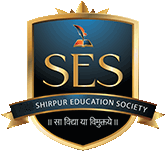Department of Electronics & Telecommunication Engineering
-
Started
2001
-
Intake
120
-
DTE Choice Code
517237210
Dr. Vijay Shrinath Patil
Head of Department
“Empowering Innovation. Enabling Excellence”
Established in 2001, the Department of Electronics & Telecommunication Engineering at R. C. Patel Institute of Technology (RCPIT), Shirpur offers industry-focused Undergraduate Program (B.Tech.) along with a recognized Ph.D. program affiliated with Dr. Babasaheb Ambedkar Technological University, Lonere.
With a strong emphasis on academic excellence, innovation, and practical learning, the department prepares students to meet global technological challenges with confidence and competence.
Vision
To produce globally competent Electronics and Telecommunication Engineers with a commitment to serve society.
Mission
- M1: To prepare and transform students from socially and economically diverse backgrounds into highly skilled engineers in the field of Electronics and Telecommunication Engineering.
- M2: To train and mentor students to have a successful professional career.
Program Educational Objectives (PEOs)
- PEO1: Able to Recognize, synthesize, and apply engineering knowledge to adopt advances in technology and solve real-world problems.
- PEO2: Able to Explore emerging career opportunities in both hardware and software domains through continuous skill development.
- PEO3: Communicate effectively, demonstrate leadership, and exhibit professional conduct in all engineering practices.
Program Specific Outcomes (PSOs)
- PSO1 (Core Competency): Apply basic knowledge related to Electronic Devices and Circuits, Electromagnetics, Digital Signal Processing, Communication Engineering and Microprocessor/ Microcontroller based Systems to solve engineering problems.
- PSO2 (Software Competency): Demonstrate proficiency in relevant software tools for real-world applications.
- PSO3 (Innovation & Publication): Develop prototypes, file IPRs, and publish technical content in journals, conferences, or technical magazines.
Key Highlights
- Highly Qualified Faculty: 12 out of 18 faculty members hold Ph.D. degree, offering students expert teaching, strong research guidance, and a vibrant academic environment.
- Strong Alumni Base: More than 2,265 students have graduated from the department and are excelling in academia, industry, and research.
- Consistently Excellent Results: 172 + University toppers, 13 gold medalists, and a history of outstanding academic performance.
- Research Excellence: Over 273 research papers published in reputed journals and conferences; 29+ patents filed/granted.
- Academic Collaborations:
- e-Yantra Robotics Lab in collaboration with IIT Bombay.
- Embedded Systems Lab in collaboration with Wipro Technologies, Pune.
- Tessolve Semiconductor Skill Development Program for test engineering.
- B.Tech. (Hons.) specializations and Minor Degrees in Computer Engineering offered to diversify academic scope.
Infrastructure & Laboratory Facilities
The department offers world-class infrastructure tailored for modern technical education:
- Fully air-conditioned smart classrooms equipped with smart boards and high-speed internet.
- 12+ laboratories designed with ergonomic furniture and modern instruments, including:
- Network and Power Electronics Lab
- Analog & Digital Communication Lab
- Digital Electronics & Fiber Optics Lab
- Microprocessor & Microcontroller Lab and IOT Lab
- Machine Learning & Artificial Intelligence Lab
- Basic Electronics & Consumer Electronics Labs
- Measurement, Control Systems, and Project Labs
- Research Lab with software tools like MATLAB, SCILAB, Python, and IE3D
- Industry-grade equipment: Power supplies, signal generators, DSOs, spectrum analyzers, and digital storage oscilloscopes.
Teaching–Learning Pedagogy
- ICT-enabled teaching using MOODLE, Smart Boards, and virtual labs.
- Access to national and international e-learning platforms: SWAYAM, NPTEL, Coursera (Stanford University) and CodeChef learn and coding platform.
- Blended learning supported by Distance Learning Centers of IIT Bombay and IIT Kharagpur.
- Local Guardian Mentoring System for personalized student guidance and support.
Industry Readiness & Skill Development
- Add-on certification courses in IoT, Python, Embedded Systems, Machine Learning, Artificial Intelligence, and Foreign Languages.
- Six-month full-time internship/industry project in the 8th semester for hands-on industry experience.
- Employability enhancement through:
- Mock interviews
- Soft skills training
- Project-based learning
- Entrepreneurship development via Innovation & Startup Center
Student-Centric Initiatives
- Technical and cultural events organized under ACES (Association of Communication & Electronics Students).
- Workshops, webinars, expert sessions, and alumni talks conducted regularly.
- Community development and social outreach through active participation in student clubs.
The Department of Electronics & Telecommunication Engineering at RCPIT is committed to nurturing technically proficient, socially responsible, and globally competitive engineers. Through a blend of advanced infrastructure, expert faculty, innovation-driven curriculum, and industry-aligned practices, the department stands as a pillar of excellence in technical education and applied research.
